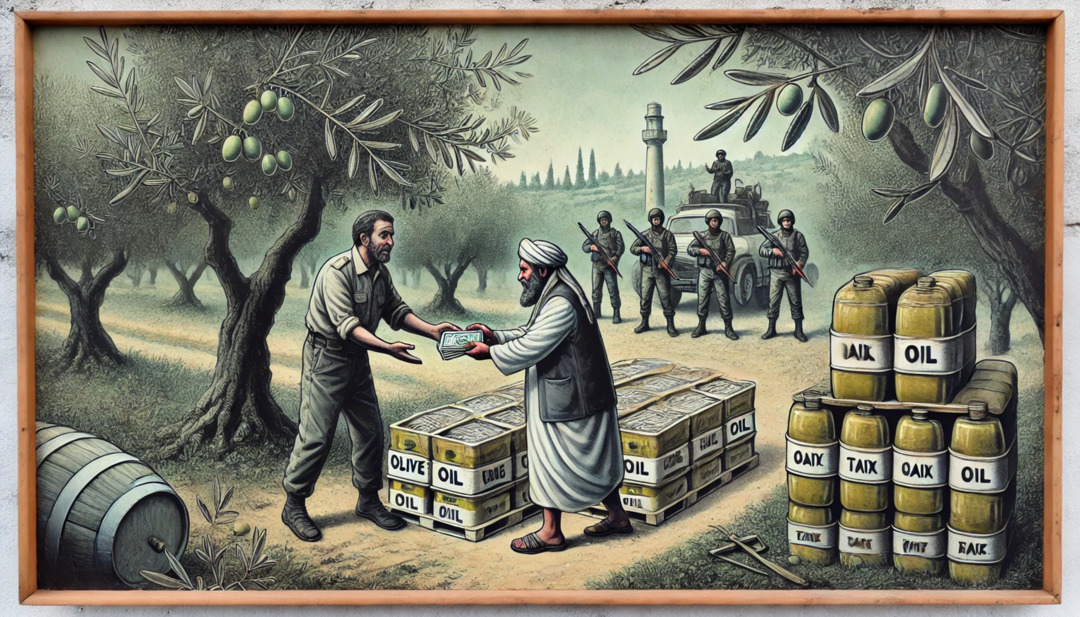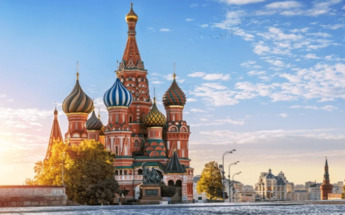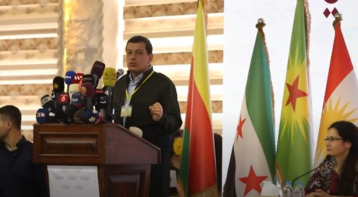-
"Pay or Leave"... Militia Equation Strangles Afrin's Olive Farmers
-
Monopoly of olive presses reflects attempt to control original residents' main income source and turn it into pressure and extortion tool

The suffering of Simalka village residents in rural Afrin has become a stark example of the olive season crisis in the region, where "Sultan Murad" militia imposes a ban on harvesting until opening their private press.
Olives represent the backbone of local economy in Afrin, famous for its ancient trees, some over thousand years old, producing Syria's finest olive oil.
Most villages in Afrin region face similar challenges, as armed militias control olive presses and force farmers to pay royalties ranging from 15% to 30% of their production.
These practices have led to sharp decline in farmers' revenues, especially with rising costs of tree care and harvesting, while some are forced to sell their crops at low prices to controlling militias.
Local estimates indicate Afrin contains more than 18 million olive trees, annually producing about 70,000 tons of oil before the Syrian crisis.
Thousands of trees were cut and vandalized in recent years, while large areas of orchards were seized and redistributed to militia elements or sold to loyal investors.
Farmers' fears of crop theft increase, especially in villages where residents are prevented from accessing their fields, where organized olive theft phenomenon spreads without deterrent.
Many farmers are forced to contract with militia-linked intermediaries to protect their crops, for an additional production share reaching 20%.
Militias impose strict system for transporting olives and oil between areas, through checkpoints imposing additional fees on each shipment, increasing production costs and reducing farmers' profit margin.
Levant-Agencies
You May Also Like
Popular Posts
Caricature
BENEFIT Sponsors BuildHer...
- April 23, 2025
BENEFIT, the Kingdom’s innovator and leading company in Fintech and electronic financial transactions service, has sponsored the BuildHer CityHack 2025 Hackathon, a two-day event spearheaded by the College of Engineering and Technology at the Royal University for Women (RUW).
Aimed at secondary school students, the event brought together a distinguished group of academic professionals and technology experts to mentor and inspire young participants.
More than 100 high school students from across the Kingdom of Bahrain took part in the hackathon, which featured an intensive programme of training workshops and hands-on sessions. These activities were tailored to enhance participants’ critical thinking, collaborative problem-solving, and team-building capabilities, while also encouraging the development of practical and sustainable solutions to contemporary challenges using modern technological tools.
BENEFIT’s Chief Executive Mr. Abdulwahed AlJanahi, commented: “Our support for this educational hackathon reflects our long-term strategic vision to nurture the talents of emerging national youth and empower the next generation of accomplished female leaders in technology. By fostering creativity and innovation, we aim to contribute meaningfully to Bahrain’s comprehensive development goals and align with the aspirations outlined in the Kingdom’s Vision 2030—an ambition in which BENEFIT plays a central role.”
Professor Riyadh Yousif Hamzah, President of the Royal University for Women, commented: “This initiative reflects our commitment to advancing women in STEM fields. We're cultivating a generation of creative, solution-driven female leaders who will drive national development. Our partnership with BENEFIT exemplifies the powerful synergy between academia and private sector in supporting educational innovation.”
Hanan Abdulla Hasan, Senior Manager, PR & Communication at BENEFIT, said: “We are honoured to collaborate with RUW in supporting this remarkable technology-focused event. It highlights our commitment to social responsibility, and our ongoing efforts to enhance the digital and innovation capabilities of young Bahraini women and foster their ability to harness technological tools in the service of a smarter, more sustainable future.”
For his part, Dr. Humam ElAgha, Acting Dean of the College of Engineering and Technology at the University, said: “BuildHer CityHack 2025 embodies our hands-on approach to education. By tackling real-world problems through creative thinking and sustainable solutions, we're preparing women to thrive in the knowledge economy – a cornerstone of the University's vision.”
opinion
Report
ads
Newsletter
Subscribe to our mailing list to get the new updates!






















